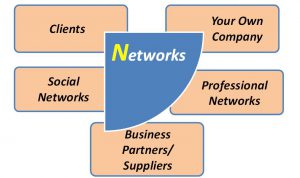Building Your ‘Networking Capital’ To Get Ahead
One aspect of our professional life that we often ignore is our network.
In today’s interconnected world, we are unlikely operate in isolation. Every contact is a potential point for future reference.
As we consider new career options, we need to be able to identify and leverage our existing networks and perhaps ‘monetise’ them.
Our network system could be summarised in the following diagram.


1. Your Clients
The vast network of clients you serve in your industry represents a rich source of potential opportunities.
If you have been servicing them well and have a good reputation or standing with them, you could join a competitor and sell your new products/services to them. Better yet, you could even join your clients!
A great example I always use is a candidate of mine, Ivy, who was a sales manager in the pharmaceutical sector.
She sold her products mainly to surgeons and medical doctors and in 2006, decided to exit the industry. She became a real-estate sales agent and began selling to this set of clients who knew her well. She was an overnight success as until then, these highly-paid medical professionals did not have an estate agent they could trust. Suddenly, she was leveraging on her network and trusted reputation to make recommendations on property investments. Today, Ivy is running her own successful agency.

2. Your Social Networks
I am not referring only to ‘online social networks’ here, but also to include our friends and fellow enthusiasts who may share a common hobby or interest.
Another candidate of mine, Lilian, decided to transform her hobby of online shopping into a respectable ‘spree-buying’ (making bulk-purchases online for large groups of people) online business.
By aggregating her entire list of friends and contacts, she was able to form a much larger group which increased their purchasing power.

3. Professional Network
This group includes your present and past colleagues and even industry peers from rival companies.
Because your reputation and experience in your domain is so strong, you could leverage yourself as an expert resource or consultant to the business.
A former client of mine, Clarence, was a very successful insurance sales manager who retired in his early 50s and conducts sales training workshops for young agents of companies he used to compete against.
By targeting his professional network of fellow insurance salespeople, he has a ready niche of potential clients waiting to learn from the best in the industry.

4. Your Own Company
Sometimes, the company we work for could be our strongest network waiting to be tapped.
Who would be better placed to understand the needs and requirements of one’s own company?
An old friend of mine, Leonard, was operations director with a very large global logistics company who after 18 years of working with them, had inside knowledge of the complexities, requirements and politics peculiar to his organisation’s structure. He knew the challenges and types of people who would be able to resolve them.
He wanted a change in career, so he then joined a top Executive Search Firm and his first (and only) client has been his former company who was all-to-pleased to have an insider who understood the work-culture identify top talents for them.
Selling to your own company can sometimes seem obvious but is often overlooked.

5. Your Business Partners/ Suppliers?
Another huge network to be tapped could be your suppliers/business partners.
Because of your long-term relationships with them, you would have probably established a certain rapport with them already.
Moreover, as you are in the same industry, you understand their challenges well and can add a different perspective to their business.
A possible career move could be transitioning from the ‘buy-side’ to the ‘sell-side’.
For instance, Jeremy, an IT manager from a Multinational Company whose job is engaging third-party services from a vendor decided to move into a sales or operations role for that vendor as he would know how MNCs procure that type of services.
“It’s the same business, just on opposite ends of the negotiation table.” He shared.
There have been similar stories of executives who have been poached by their suppliers – it all depends on how well you network with them and also how good your reputation is in the industry.

Your network could be very valuable for the next employer or for starting a business.
You just need to spend some time thinking about the people you interact with regularly, and the type of opportunities you could leverage out of them.
However, in order to get the most out of your networks, you need to be reminded that they will only want to partner with you if you have been doing a great job working with them, so keep up the good work and watch your Network Capital grow.



